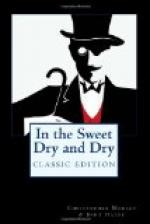There was a shout of applause, and Quimbleton’s salient of horse-hair beard waved triumphantly as he gathered strength. His burly figure in the lilac upholstering dominated the audience. He went on:
“And what is our crime? That we have nourished, in the privacy of our own intellects, treasonable thoughts or desires concerning alcohol! Gentlemen, it is the first principle of common law that a man cannot be indicted for thinking a crime. There must be some overt act, some evidence of illegal intention. Can a man be deprived of freedom for carrying concealed thoughts? If so, we might as well abolish the human mind itself. Which Bishop Chuff and his flunkeys would gladly do, I doubt not, for they themselves would lose nothing thereby.”
Vigorous clapping greeted this sally.
“Now, gentlemen,” cried Quimbleton, “though we follow a lost cause, and even though the gooseberry and the raisin and the apple be doomed, let us see it through with gallantry! The enemy has mobilized dreadful engines of war against us. Let us retort in kind. He has tanks in the field—let us retort with tankards. They tell me there is a warship in the offing, to shell us into submission. Very well: if he has gobs, let us retort with goblets. If he has deacons, let us parry him with decanters. Chuff has put us here under the pretext of being drunk. Very well: then let us be drunk. Let us go down in our cups, not in our saucers. Where there’s a swill, there’s a way! Let us be sot in our ways,” he added, sotto voce.
Terrific uproar followed this fine outburst. Quimbleton had to calm the frenzy by gesturing for silence.
“I hear some natural queries,” he said. “Some one asks ‘How?’ To this I shall presently explain ‘Here’s how.’ Bear with me a moment.
“My friends, it would be idle for us to attempt the great task before us relying merely on ourselves. In such great crises it is necessary to call upon a Higher Power for strength and succor. This is no mere brawl, no haphazard scuffle: it is the battle-ground—if I were jocosely minded I might say it is the bottle-ground—of a great principle. If, gentlemen, I wished to harrow your souls, I would ask you to hark back in memory to the fine old days when brave men and lovely women sat down at the same table with a glass of wine, or a mug of ale, and no one thought any the worse. I would ask you to remember the color of the wine in the goblet, how it caught the light, how merrily it twinkled with beaded bubbles winking at the brim, as some poet has observed. If I wanted to harrow you, gentlemen, I would recall to you little tables, little round tables, set out under the trees on the lawn of some country inn, where the enchanting music of harp and fiddle twangled on the summer air, where great bowls of punch chimed gently as the lumps of ice knocked on the thin crystal. The little tables were spread tinder the trees, and then, later on, perhaps, the customers were spread under the tables.—I would ask you to recall the manly seidel of dark beer as you knew it, the bitter chill of it as it went down, the simple felicity it induced in the care-burdened mind. I could quote to you poet after poet who has nourished his song upon honest malt liquor. I need only think of Mr. Masefield, who has put these manly words in the mouth of his pirate mate:




